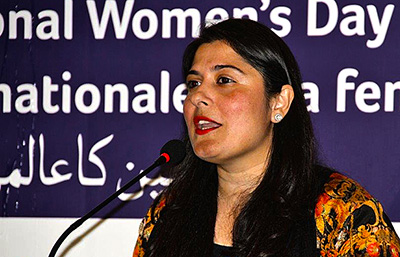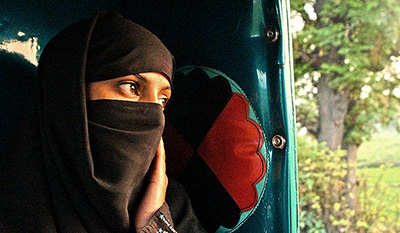Q&A with Sharmeen Obaid-Chinoy, Pakistani Journalist, Activist and Film-maker
Date:
Author: Faria Salman

In a vibrant finale to commemorations of International Women’s Day events in Pakistan, and in honoring Sharmeen Obaid-Chinoy, UN Women with the High Commission of Canada and the British High Commission co-hosted the Country’s second screening of the Oscar winning documentary ‘A Girl in the River: The Price of Forgiveness’.
The event held was held on 11 March 2016 in Islamabad.
With your second Oscar Academy Award documentary and second Oscar win, both of which have touched on two real and very moving stories – an acid crime victim and a survivor of honor killing - what has been your inspiration to make such films?
‘Saving Face’ and ‘A Girl in the River: The Price of Forgiveness’ both focus on important issues and they, in their own way, speak volumes about the kinds of choices women have in the world and how our lives are impacted by the decisions taken by others. I am always looking to bring the stories of marginalized communities to the forefront, and feel strongly about making such narratives accessible to a larger audience.
Of all the women you have come across in your film-making, whose story has had the most impact on you – why and how?

I was very inspired by the story of Zakia from ‘Saving Face’, a woman who was attacked by her husband when she asked him for a divorce. Zakia took the brave step of pressing charges against her husband and took the risk of moving out of his home with her daughter and son. Aided by her children, Zakia underwent treatment and fought her court case simultaneously. Her resolve when facing such unimaginable circumstances motivated me both as a filmmaker and as a mother. I feel lucky to have met Zakia, and am grateful that I had the opportunity to be with her as she moved through some of the most trying times of her life with poise and ease.
Your documentaries reflect untold ‘gender-based’ violence stories from Pakistan, but the issues are global. As a female film-maker who is “shaking the status quo” on crimes that violate women’s human rights, have you ever faced any backlash?
My films hope to highlight the efforts and struggles of marginalized individuals who are caught in difficult circumstances, and this is not just isolated to women. In my career, I have focused on human rights and the plight of children in war torn areas as seen in ‘Pakistan’s Taliban Generation’. I have had the privilege of highlighting the stories of the transgender community in ‘Transgenders: Pakistan’s Open Secret’, Iraqi refugees in ‘Jordan and Syria in Iraq: The Lost Generation’, and harrowing stories of women undergoing illegal abortions in the ‘Philippines in City of Guilt’. All these stories are united in the fact that their struggles have been neglected or voices have been hushed – for reasons varying from illiteracy to extremism.
I welcome criticism because, as a documentary filmmaker, I feel that it is my duty to address issues that people do not want to discuss. I’ve always been interested in topics about human rights and women’s issues that many people find controversial. I choose to film subjects that spark difficult conversations and make people uncomfortable. Change only comes about when people are forced to discuss an issue, and that’s what I hope my films do by highlighting the issue.
Domestic violence is not a justified crime in any form or action. What are some of the key messages from your documentaries that should reach out to women and young girls suffering from abuse and violence?
Domestic violence affects women across the globe so it is important to know that you are not alone, there is help out there. It’s a repetitive cycle and unfortunately, once it begins, it rarely ever stops. According to the World Health Organization, 35% of women worldwide have experienced violence at the hands of their partners in their lifetime. It is important to talk about it with someone you trust and make a decision that’s right for you and/or your children. It’s important to think about yourself in this case and leave. Never blame yourself – the only thing to blame is a man’s insecurities.
In 2014, one of the episodes that we launched as part of a twelve-part series called Aghaz-e-Safar for Pakistani television, focused on the issue of domestic violence in the country. We took an in-depth look into the lives of women who have been physically and mentally tormented at the hands of domineering family members. We interviewed victims, perpetrators and activists in an effort to penetrate deeper into the causes and consequences of such abuse.
Many Pakistani women including yourself are breaking gender barriers and stereotypes in a patriarchal society. Do you think men are also being confined by gender stereotypes – why and what can they do to ‘break free’?
Stereotyping any gender, religion, class or ethnicity is very dangerous because it feeds into inequality, and the same is true when it comes to stereotyping men. That being said, over the last few decades, it has been much easier for men to break free from stereotypical gender roles. You see more and more men entering the field of fashion, theatre and arts but women are still sidelined when it comes to education, job opportunities, public spaces and perhaps most dangerously, their homes.
Every year, hundreds of women are killed in the name of honor: she is killed because ‘she ran away from home’ or ‘she fell in love" or because "she wanted a divorce" and these cases receive scant attention from the media, politicians, lawmakers and even civilians (all of which exist with women in minority amounts).
I fear that a healthy and necessary conversation about gender will get swallowed by what is often posed as ‘more important and more pressing’ matters. Conversations in Pakistan, whether they are occurring in the drawing room or in the parliament, are almost exclusively about the political turmoil in the country. We are a nation that is currently fighting a number of civil insurgencies, in addition to dealing with rising levels of bigotry and intolerance. In the past, nations that have gone through similar bouts of unrest such as Afghanistan and Iraq, have bartered the issue of women’s rights for what was posed as the greater political good. I fear that the same will happen in Pakistan.
The very fact that women are currently unable to make their own policy decisions in certain parts of the country is an alarming reality, and pushes us further away from being the owners of our own stories and fighters for our own rights
How best can we engage boys and men in our shared struggle against gender-based violence?
We have to start from the very beginning and raise our sons to respect women. It has to start from the home and continue through in schools and colleges where it is important to incorporate talks about gender equality – only then will we see the fruits of what we reap on a national policy level.
Your second Oscar documentary film winner ‘A Girl in the River: The Price of Forgiveness’ has caught the personal attention of the Prime Minister of Pakistan with a commitment to amend honour killing and rape laws. Other than “women friendly” legislation, what would you say are the biggest obstacles for victims of violence to get justice without delay and exploitation?
‘A Girl in the River: The Price of Forgiveness’ has been nominated for an Academy Award and now, with the world watching, the film has elevated the issue of honor killings to the national sphere. It has spurred more support for the victims of honor killings and sends out a strong message that this practice is a stain on our society.
The Prime Minister of Pakistan, Nawaz Sharif has vowed to eradicate honor killings after the Oscar nomination. As a father and a grandfather, it is important for him to make that gesture, not only to the women of Pakistan, but also to the women of his own family.
The prevalence of such attacks stem partly from structural inequalities that make it difficult for women to access the judicial system in addition to longstanding cultural practices that support gender discrimination. The perpetrators know that they will only serve a few years in jail if they are found guilty. The lack of liability coupled with an embedded patriarchal system allows for honor killing crimes to run rampant – and this is exactly what we need to tackle in order to get justice for the victims of honor killing.
What is your message to young girls and women who think living a life free of discrimination and violence remains a “mirage” in Pakistan?
I think the most important message that I can give to young girls and women is to never lose hope. There have been many times during the course of filming when I have felt emotionally overwhelmed, but I have found hope and inspiration in my subjects and their ability to pursue life-altering decisions under the toughest of circumstances. Let their courage motivate and inspire you to become change-makers yourselves. The last few decades have seen many challenges for Pakistan but it is our home. It is our responsibility as Pakistanis to unite and find solutions. If we don’t then who will?
For more information:
Please contact: Faria Salman
Strategic Management and Partnerships Officer &
Communications Focal Point for UN Women Pakistan
Email: [ Click to reveal ]